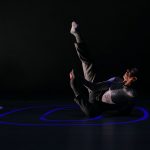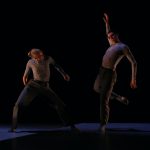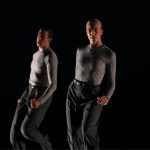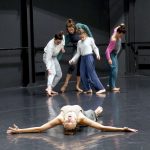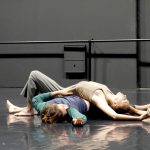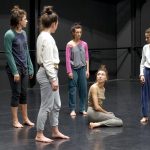Evening of Dance Production Centres
An evening that brings together three Italian Dance Production Centres: the National Dance Foundation/Aterballetto of Reggio Emilia, DanceHaus Company/DanceHauspiù of Milan and Scenario Pubblico/Compagnia Zappalà Danza of Catania.
An opportunity to get to know the languages of three established companies on the national scene.
Choreography: Diego Tortelli
Dancers: Cristian Cucco, Annemieke Mooji
Music: AAVV
Lights: Carlo Cerri
Video graphic design: Michele Innocente
Production: National Dance Foundation / Aterballetto
Co-production: Festival Oriente Occidente Within EBA Europe Beyond Access, co-financed by the Creative Europe programme of the European Union.
Feeling Good is a duet by Diego Tortelli for an able-bodied dancer and a disabled dancer. A circle, a square and, in the centre, the emblematic figure of a man. The references to the Vitruvian Man are obvious, and this can lead to criticism and controversy, but if we simply do not dwell on the image itself and what the eye sees, but focus on its poetics and meaning, we find the desire for a body that experiences a connection with itself and its surroundings, both on a rational and emotional level. This is the starting point of Feeling Good, a duet on the ability to “be” and “feel”, on the acceptance of oneself, of one’s strength and fragility. Feeling Good looks at the diversity of human beings in an asymmetrical way, opposing the idea of ‘canonical’ beauty and universal models of ‘beauty’.
Direction and choreography: Erika Silgoner
Original music Samuel Puggioni Dance Gloria Ferrari, Giovanni Leone
Co-production DANCEHAUSpiù – Festival tanzOFFensive EISFABRIK
“Gōlem, from the Hebrew embryo, raw mass.
Matter to which a soul has not yet been infused.”
The word “Gōlem” appears within the Holy Scriptures and means “light form”, “raw” material. It is the unfinished human being before the eyes of God, it is Adam. In modern Hebrew it means ‘dumb’ or ‘defenceless’.
Choreographer Erika Silgoner, fascinated by this anthropomorphic figure, revisits the myth of “Gōlem” to investigate the existential limits of contemporary man and the complex laws that govern life and love.
“Gōlem – Amore Sintetico” tells the poetics of a relationship, if it can be defined as such, between a man and his anthropomorphic frustration, the distance between the dreamed love and the inability to realize it.
The story is meant to be a paradox: the love between a man and an unreal being. In a claustrophobic solitude, however, there remains the desire for possession, the desire for beauty and its imagery, the desire for love, no longer authentic, no longer possible, but synthetic.
A love that violently wants to represent the distance that man himself wants to take from real emotions, as if to preserve himself from pain and from a new, inevitable failure.
Choreography: Alessio Distefano
Dancers: Corinne Cilia, Anna Forzutti, Gaia Occhipinti, Silvia Rossi, Joel Walsham, Aya Degani. Lights and costumes: Alessio Di Stefano
Production: Scenario Pubblico – Centro Nazionale di Produzione della Danza Project realized with the support of MIC Ministry of Culture and SIAE, within the program “Per Chi Crea”.
“FORTE” is a tale of mirroring that reflects a society committed to a path that imposes a path to follow and that leaves no room for individuality.
“FORTE” is a journey that investigates the inner strength within each of us, that necessary energy that allows us to react and overcome the adversities of life.
The dancers are imprisoned by a systematic vortex, forced to always follow the same path, depriving themselves of joy and love in a seemingly endless loop.
This cold and inexpressive chain is destined to break, shattering a habit, as well as their bodies, thanks to the notes of Beethoven’s piano concerto, N°5 In E FlatMajor, Op.73 Adagio un poco mosso – their direction will be diverted towards a new awakening, pushing them to the discovery of their own individuality.


